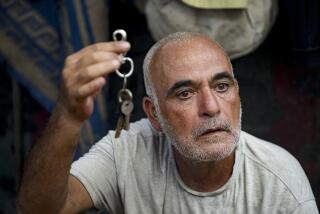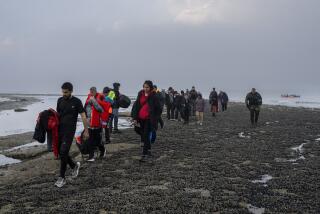Agony of missing migrants’ parents
- Share via
ANNABA, ALGERIA — When his son Merouane left home one night in April, Kamel Belabed thought he was taking a short road trip.
But one of his son’s friends phoned the next day to say that Merouane, 25, had left by boat, attempting the hazardous 150-mile journey across the Mediterranean from this eastern Algerian city to Sardinia, Italy. Belabed hasn’t heard from his son since.
As he pieced together details of how his son stole away, Belabed came into contact with other Algerian families in similar straits who were just as desperate to know what had happened to their lost children.
They are among tens of thousands of would-be migrants who attempt the journey from Africa to Europe each year. Hundreds are known to die annually in the effort, their bodies washing up on both sides of the sea. Many others simply vanish.
Belabed is breaking taboos about discussing the migrants, and is demanding answers. He created a network of about 40 families that aims to warn off those planning to track loved ones down.
Some parents say they would go so far as to report their own fleeing children to the authorities in the hope of seeing them again unharmed.
“What we are demanding is the right of these fathers to know where their sons are,” said Belabed, 60, speaking in his modest graphic design office in a suburb of Annaba alongside two other men whose sons had left.
“The problem is that there’s total silence” about the issue, he said.
Belabed and the other parents are applying to create an association that can act as an intermediary with the authorities, tipping off the coast guard and officials about new departures.
Belabed said he has accepted that if his son has broken the law, he could face prison. The important thing, he said, is to know what happened.
“The authorities do what they can, but a boat cannot be detected by radar. The places and times [of departure] are spread out,” he said.
In Algeria there are two main illegal emigration routes: from the western province of Oran toward Spain and, more recently, from Annaba to Sardinia.
Algerian media reports say that hundreds of illegal migrants have been intercepted this year by the coast guard, including 210 near Annaba in the last three months. Deaths are also common. Recently the Quotidien d’Oran newspaper reported that three bodies were found off the Algerian coast.
According to Italian Interior Ministry estimates, 960 people -- almost all of them Algerian -- crossed to Sardinia alone in the first eight months of 2007, while the total number of immigrants arriving illegally by boat on Italian shores over the same period was 12,419. And those are only the officially registered figures.
Italian and Algerian officials have pledged to crack down on the flow of boats toward Sardinia, with Algeria’s ambassador to Italy, Rachid Marif, promising to speed the process of repatriation of would-be migrants at a meeting in August, a statement from the Italian Interior Ministry said.
But Algerian families also want authorities to commit more resources to searching for groups lost at sea and identifying those who -- dead or alive -- make it to Europe or are found off the coast farther east, near Tunisia, Belabed said.
He has sent dozens of letters, photo IDs and e-mails to ministries, embassies and coast guard authorities in Algeria, Italy and Tunisia asking after his son and some 30 others -- so far without any definite response.
Standing by a wall of Belabed’s office covered with the pictures of missing young Algerians, Boubekeur Sabouni showed a passport filled with Tunisian border stamps. It was a record of his journeys in search of his son Faycel, 25, who left in May in a group of seven.
When their boat was found drifting 15 miles off the Tunisian coast five days later, only one of the men was in it, and he died the next day after being hospitalized with hypothermia, Sabouni said.
Algerian authorities claim the problem of the harraga, as they are known in local dialect -- literally, those who “burn” frontiers by leaving clandestinely -- has been diminishing as economic conditions in the North African country improve.
In Algeria, a major oil and gas exporter, unemployment has dropped from 27.3% in 2001 to 12.3% in 2006, according to official figures. But the jobless are often young, employment is insecure and living costs have risen.
The parents in Belabed’s network are worried that once their sons leave illegally, they could fall prey to human trafficking or terrorist networks.
Belabed said that since groups began to leave Annaba in the summer of 2006, the flow has gradually accelerated, with dozens now leaving on a single day.
Those who leave pay $820 to $1,360 -- several times the average monthly wage -- for a boat, or to one of the smuggling networks that operate along the North African coast.
“The problem isn’t one of immediate employment. It’s one of supporting a family, planning to have a car or a house or to get married,” Belabed said. “If they could find the means, everyone would leave tomorrow.”
More to Read
Sign up for Essential California
The most important California stories and recommendations in your inbox every morning.
You may occasionally receive promotional content from the Los Angeles Times.













